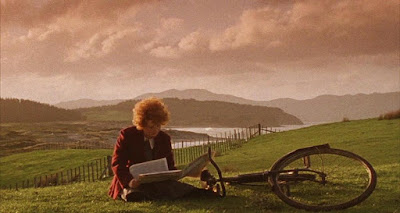Quest Status: 755 / 1000
TSPDT Rank #622
Even after 120 years of film history, and lots of advancements (as well as setbacks) in women's rights during that time, it still comes as something of a shock to see a film by a female director, with a female main character, more women than men in the cast, written by a woman and based on the autobiography of a female author. It's a good shock, of course, but it serves to illustrate how few films like this there have been - and why directors like Jane Campion are so important in film history.

As for the film itself, it's actually based on not one, but three autobiographies by the New Zealand poet and novelist Janet Frame. It was made as a three-part TV miniseries, with one episode for each book, which actually makes it feel like a pretty brisk watch. The first episode, To the Is-land, focuses on Janet's childhood. It's a lyrical and evocative portrait of growing up in WWII-era New Zealand. The second episode, which shares the title of the main film, is the most harrowing of the three parts. It covers Janet's failed attempt to become a teacher and her subsequent diagnosis with schizophrenia, which landed her in a lunatic asylum for eight years. Here, the necessary compression of time is noticeably, as it doesn't feel like eight years have passed once she's finally released, but the utter destructiveness and cruelty of the "hundreds" of electroshock treatments and inhuman treatment she received are palpable.

The third episode, The Envoy from Mirror City, finds Janet in the midst of a late blooming which occurred well into her adult life, during which she traveled around Europe and wrote some of her most acclaimed works - including a novel about her horrific experiences being treated for schizophrenia. This episode is like the calm after the storm, and is notable for Campion's exquisite rendering of how it feels to be a woman experiencing life's many pleasures and pains for the first time. To add to the list above, it's also highly unusual to see a woman who doesn't fit traditional standards of beauty in full nudity - but we see Janet naked quite a bit in this last section of the film. As with just about everything else in the movie, Campion captures it with incredible lyricism and delicacy, transforming a movie that could have been an average biopic into one that manages to convey something of the essence of its subject.
--- 245 films remaining ---
NOTE
This review is part of my new Tumblr blog Cinema Cycles, which can be found here.

No comments:
Post a Comment